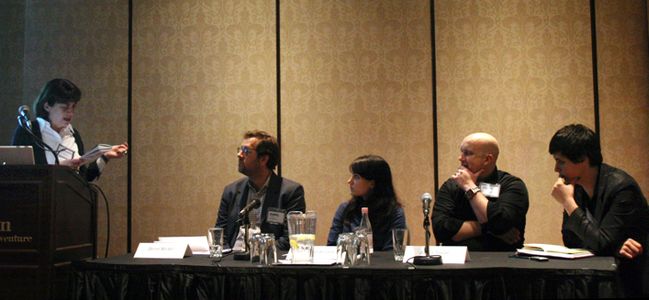Rania Ghosn chairs an ACSA panel on Energy as Spatial Project
Postdoctoral Fellow Rania Ghosn chaired a panel at the 99th Annual Meeting of the Association of Collegiate School of Architecture (ACSA) held March 3-6 in Montreal, Canada. The panel, entitled “Energy as Spatial Project,” addressed the central question: What potentialities do practices of architecture, urbanism, and landscape carry in embodying “alternative” energy spatialities? The session critiques the process of creation of value in energy regimes, which has long externalized costs to the periphery and invisible.
The papers presented examined the topic from historical, contemporary, and speculative perspectives, in an attempt to locate design’s agency in relation to debates on technology, politics, nature, organization, and scale. Daniel Barber, a Ziff Environmental fellow at Harvard University, presented a paper entitled “Tomorrow’s House: Solar Energy and the Suburban Territorial Project, 1938-1947.” His presentation addressed the role of solar house heating in the speculative experimentation characteristic of the architectural discourse in the period surrounding World War II, and which came to be seen as a necessary ingredient to the provision of housing after the war. Marianna de Cola, a Masters architectural student at the University of Waterloo, presented a paper on “Shifting Infrastructures.” She looked at the nature of mutable landscapes, settlements, and infrastructures in the history of the Canadian island Newfoundland’s relation to the sea. Her investigation poses the possibility that a contemporary energy infrastructure may become a physically and culturally pronounced manifestation of a layered historical narrative. Justin Taylor, manages the CACAM lab at Mississippi State University. His paper, “Digital Machines Teach Basic Principles of Balance in Eco-Friendly Design,” recognizes the imperative for teaching methods to reinforce a commitment to our ecosystem, and for designers to recognize the complexities that both nature and technology bring to future design. He uses a prototyping board, which extends simple mechanics into the decision-making process and places emphasis on how the smallest of changes can influence the system as a whole.
At the Pardee Center, Rania coordinates the Sawyer Seminar on Energy Transitions, funded by the Mellon Foundation, and which bring together leadings scholars to discuss various aspects of how energy transitions are themselves socially constituted and how they have, and are likely to, impact society.
